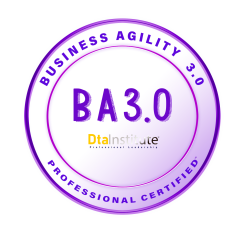
Business Agility (BA®) is a certification that allows validating agility knowledge such as the definition of agile, agile manifesto, when to use agile? Agile considerations within the company.
-
Business Agility 3.0 Model Analyzes from customer centricity approaches to actionable metrics.
Development and application of the model focusing on good practices applied in various industries worldwide.
Evaluate organizational maturity in agility through the 180° model proposed by DTAI®.
USD 200
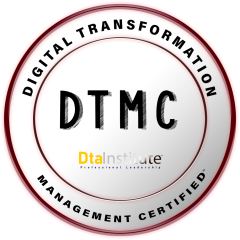
Digital Transformation Management Certified (DTMC®) is a certification that validates the knowledge and skills of professionals who have performed in Agile and Digital Transformation processes in different organizations, managing to reinvent business models and improve results at the business level.
-
Validate knowledge and skills in the Change Management Process.
Validate the use of tools such as the Digital SWOT Matrix, definition of purpose and development of projects with various innovation frameworks.
Validate the use of tools such as the Digital SWOT Matrix, definition of purpose and development of projects with various innovation frameworks.
USD 150
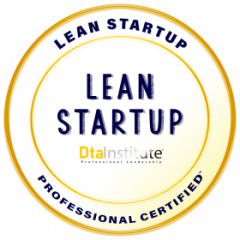
Lean Startup Professional Certified® is a certification that helps you understand and apply the Lean Startup method for building an MVP. This certification is accredited by the DTA Institute™, and it generates value for you by increasing the success of your products.
-
Develop the three stages of the Lean Startup method
Describe and understand the importance of an MVP
Understand the key to pivot to adapt to the market and changes.
Find relevant knowledge and needs for customers.
USD 0
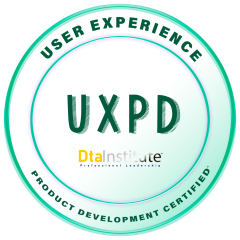
UX & Product Development®️ (UXPD) is an advanced certification in User Experience, where the applicant must enroll in an official UX & Product Development®️ (UXPD) course with any company representing DTAI®️ to develop a real project about their company using the User Experience (UX) process. ®️).
-
Develop the research process with any of the following methods: interviews, surveys, focus groups, observation, or ethnography.
Find relevant insights and needs for users.
Develop and implement an ideation process with a simple sketch of the prototype to be presented.
Apply feedback on the prototype with end-users.
Define and monitor metrics of user experience.
USD 20000
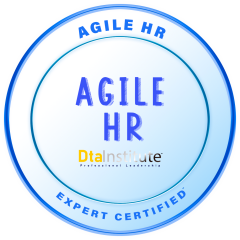
Agile HR Expert Certified (Agile HR®) is a certification in Agile HR, where the applicant must enroll in an official Agile HR course with any company that represents DTAI®️, applying the tools and techniques for the creation of the culture and structure organizational.
-
Develop the process of cultural transformation applying various tools such as Agile Culture, Culture Canvas, among others.
Find relevant knowledge and needs for employees.
Develop and implement a sustainable transformation and adoption process, based on the employee.
Apply the Agile Carrier Model
Define and monitor employee experience metrics.
USD 200
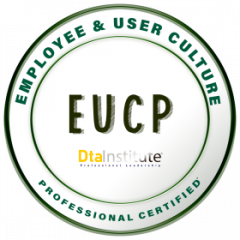
Business Agility (BA®) is a certification that allows validating agility knowledge such as the definition of agile, agile manifesto, when to use agile? Agile considerations within the company.
-
Business Agility 3.0 Model Analyzes from customer centricity approaches to actionable metrics.
Development and application of the model focusing on good practices applied in various industries worldwide.
Evaluate organizational maturity in agility through the 180° model proposed by DTAI®.
USD 200
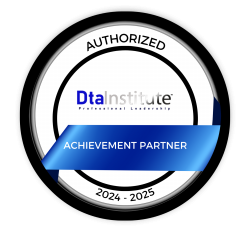
This certification represents a significant achievement in the field of training and professional development. Granted by DTA Institute, the AAP certification symbolizes competence, commitment, and excellence in teaching.
-
1. Develop Competencies: Enhance the training and teaching skills of professionals.
2. Increase Credibility: Validate trainers' experience and knowledge on an international level.
3. Promote Excellence: Foster high standards in training and professional development.
4. Facilitate Networking: Connect certified professionals with a global network of educators and trainers.
5. Encourage Continuous Learning: Promote professional growth through ongoing education and skill updates.
6. Ensure Educational Quality: Guarantee that trainers provide high-quality education to their students.
USD 200
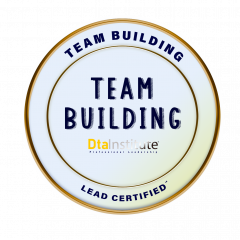
In a workplace where collaboration is essential, we present the Team Building Lead Certified program, designed to enhance leadership and teamwork skills. Participants will embark on a journey of self-discovery, exploring their strengths and areas for improvement, creating a solid foundation for personal growth. Next, they will focus on developing leadership skills, learning to inspire and motivate their teams through practical dynamics and case studies. Communication will be another cornerstone of the program, teaching techniques for active listening and constructive feedback—key to fostering a trusting environment. Through team-building activities, participants will experience the importance of collaboration and valuing diversity. Finally, coaching will be addressed, equipping participants to become effective mentors who support the development of their colleagues. Upon completion, they will receive the Team Building Lead Certified title, certifying their commitment to personal gr
-
1. Develop Self-Awareness Skills: Foster self-awareness in participants by helping them identify their strengths and areas for improvement, enabling them to lead with confidence and authenticity.
2. Enhance Leadership Abilities: Equip participants with effective tools and techniques for leading teams, inspiring others, and managing group dynamics effectively.
3. Improve Effective Communication: Teach participants to communicate clearly and assertively, promoting an environment of trust and collaboration within the team.
4. Promote Teamwork and Coaching: Develop competencies in collaborative work and coaching, allowing participants to support the growth of their colleagues and improve team cohesion.
USD 200
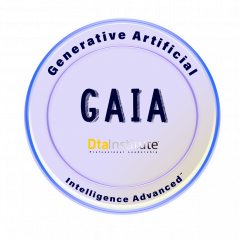
The Generative Artificial Intelligence Advanced certification is designed for professionals and enthusiasts aiming to master advanced applications of generative artificial intelligence. This program covers the strategic use of tools such as language models (ChatGPT), visual content generation (DALL·E), integration with custom workflows, and the creation of intelligent systems like advanced chatbots and automated platforms. Participants will gain hands-on skills to implement generative AI solutions in real-world projects, focusing on innovation, scalability, and optimization of complex processes.
-
1. Master advanced techniques for implementing generative AI models in practical and scalable solutions.
2. Design and customize automated workflows integrating generative AI tools like ChatGPT and DALL·E.
3. Develop intelligent chatbots capable of interacting contextually and strategically in business environments.
4. Implement APIs and advanced tools to customize and extend the functionalities of generative AI in specific projects.
5. Optimize complex processes using AI-driven automated systems, enhancing organizational efficiency.
6. Evaluate and adapt generative AI technologies to real-world use cases, ensuring alignment with business and ethical objectives.
USD 200
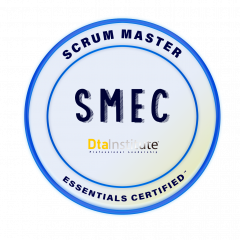
The Scrum Master Essentials Certified certification is a recognition that validates the fundamental knowledge and skills required to lead agile teams and facilitate the implementation of Scrum within an organization. This certification is designed for professionals who seek to gain a solid understanding of Scrum principles and practices, transforming them into change agents and key facilitators within agile teams.
-
1. Understand the Scrum Framework: Gain a solid understanding of the Scrum framework, including its roles, events, and artifacts, and how they contribute to delivering value in agile projects.
2. Master the Scrum Master Role: Learn the responsibilities and skills necessary to be an effective Scrum Master, including facilitating Scrum ceremonies, supporting the team, and removing impediments.
3. Foster Team Collaboration: Develop the ability to encourage collaboration and communication within the Scrum team, promoting a positive and productive work environment.
4. Apply Scrum in Real-World Scenarios: Learn how to apply Scrum principles and practices in real-world projects, handling challenges and adapting Scrum to fit the team and organizational needs.
5. Enable Continuous Improvement: Gain the skills to help the team and organization continuously improve by encouraging feedback, reviewing performance, and promoting a culture of agility.
USD 200
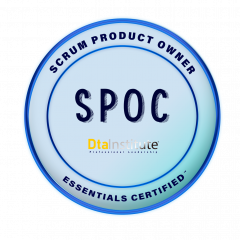
The Scrum Product Owner Essentials Certified™ (SPOC™) certification provides a comprehensive understanding of the fundamental principles and responsibilities of a Scrum Product Owner. This certification ensures that professionals are equipped with the necessary knowledge to manage product development effectively in Agile environments. The certification covers: -The fundamental principles of Scrum and Agile methodologies. -The specific roles and responsibilities of a Product Owner in a Scrum Team. -Techniques for defining a clear product vision and communicating it to stakeholders. -Effective Product Backlog management, including prioritization and refinement. -The importance of stakeholder collaboration to maximize business value. -Best practices for working with Scrum Masters and Development Teams. This certification is designed for professionals in product management, project management, software development, and business analysis who want to enhance their understanding o
-
By completing this certification, participants will be able to:
✅ Understand the Scrum framework and the Product Owner’s role within it.
✅ Define and articulate a clear product vision aligned with business goals.
✅ Effectively manage the Product Backlog by refining and prioritizing user stories.
✅ Engage with stakeholders to gather feedback and maximize product value.
✅ Work efficiently with Scrum Masters and Development Teams to ensure smooth execution.
✅ Utilize Agile metrics and KPIs to measure and improve product success.
✅ Gain a strong foundation to pursue advanced Scrum Product Owner certifications.
USD 200
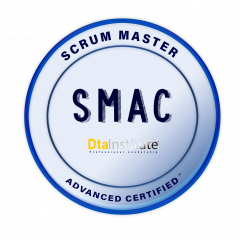
The Scrum Master Advanced Certified program is designed for professionals who already have foundational knowledge of Scrum and wish to deepen their mastery in Agile leadership. This certification explores advanced facilitation techniques, scaled agile frameworks, metrics, and coaching capabilities, enabling Scrum Masters to lead organizational transformation and deliver high-performance results in complex environments.
-
- Strengthen leadership and facilitation skills within Agile teams
- Apply advanced Scrum practices at a team and organizational level
- Learn to manage conflicts, resistances, and changes during Agile transformations
- Understand and implement metrics that drive continuous improvement
- Enhance coaching capabilities to support team development and agile maturity
USD 200
The AI Agent Advanced Certification validates the participant’s ability to design, develop, and integrate advanced artificial intelligence agents. This level assesses the implementation of memory, integration of external tools, autonomous workflows, multimodal capabilities (voice, image, text), and real-world business applications.
-
1. Demonstrate technical mastery in building autonomous agents with multi-capabilities.
2. Evaluate advanced integration with platforms like Make, LangChain, OpenRouter, and Voiceflow.
3. Apply Retrieval-Augmented Generation (RAG), persistent memory, and embeddings.
4. Implement personalized agents to solve real-world business problems.
5. Validate knowledge of security, ethics, customization, and prompt optimization.
USD 200
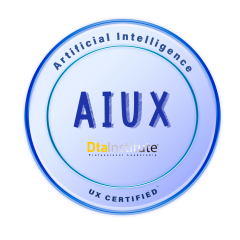
This certification validates the understanding and application of core principles in Customer Experience (CX) and User Experience (UX) design, powered by Artificial Intelligence. The certified professional demonstrates mastery in creating Phygital (physical-digital) relationship models, implementing Customer Digital Twins for predictive personalization, achieving the strategic automation of contact points, and utilizing advanced analytics to optimize the Customer Journey.
-
1. Design unified and hyper-personalized experiences using the Customer Digital Twin (CDT) model.
2. Effectively integrate the physical and digital worlds through the Phygital Experience approach.
3. Apply methodologies like Journey Mapping with UXpressia and Service Blueprinting to optimize the value chain supporting the customer experience.
4. Implement AI and automation solutions that reduce Customer Effort Score (CES) and drive service proactivity.
5. Utilize Experience Analytics to identify pain points and measure the impact of AI solutions on satisfaction (NPS) and Customer Lifetime Value (CLV).
USD 200